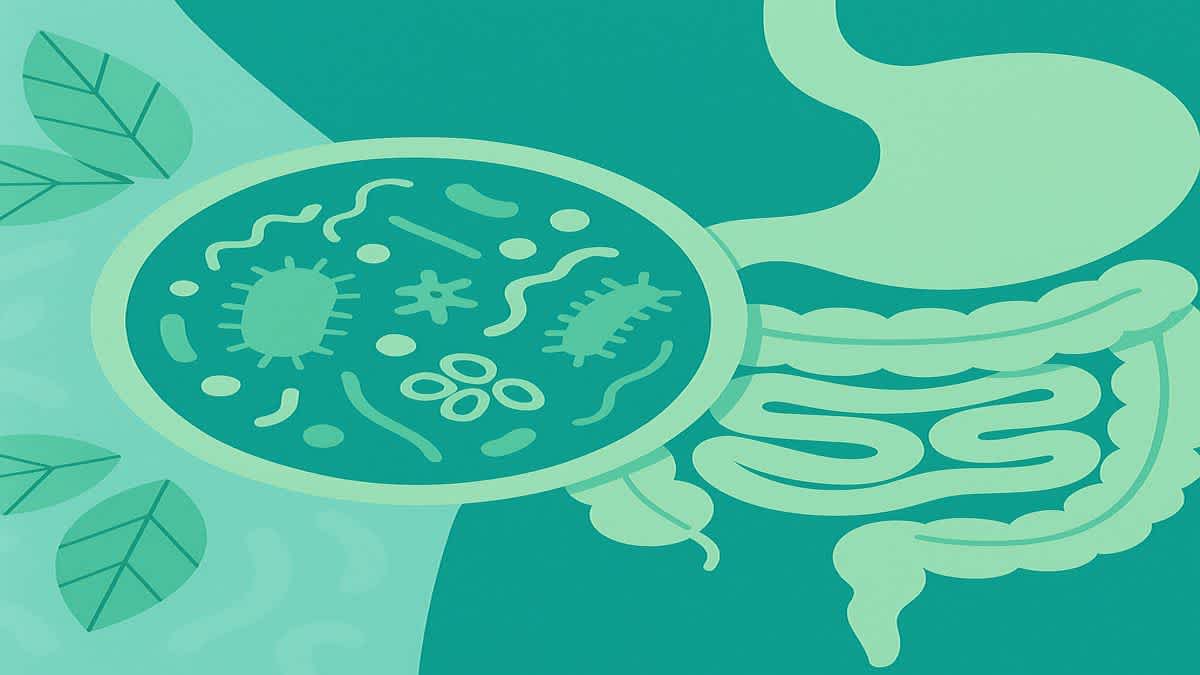
A Complete Guide to Gut Health and Disease Prevention
Written on October 10, 2025 by Dr. Diana Rangaves. To give you technically accurate, evidence-based information, content published on the Everlywell blog is reviewed by credentialed professionals with expertise in medical and bioscience fields.
Table of contents
- What Is the Gut Microbiome and Why Does It Matter?
- Your Unique Microbial Fingerprint
- The Essential Roles of Your Gut Microbiome
- The Gut Microbiome’s Role in Chronic Disease Prevention
- What Disrupts Your Gut Microbiome?
- Building and Maintaining a Healthy Gut Microbiome
- The Future of Personalized Gut Health
- Take Control of Your Gut Health Today
Why Is the Gut Microbiome Important? Your Complete Guide to Gut Health and Disease Prevention
Right now, around 100 trillion bacteria are living in your gut, carrying over 3 million genes and helping to manage your immune system.[1] Far from being just passive passengers, these microbes play a crucial role in keeping you healthy and preventing disease.[2]
The gut microbiome is the collection of microbes and their genetic material that live in the digestive tract. Understanding why the gut microbiome is so important could be the key to improving your well-being and living a longer, healthier life.[2]
Here, we’ll explore how your gut microbes work, why they matter, and practical steps you can take to keep your gut in top shape.
What Is the Gut Microbiome and Why Does It Matter?
Your gut microbiome refers to the collective genetic material of all microorganisms—bacteria, viruses, fungi, and other microbes—living in your digestive tract.[2] The term is often used interchangeably with “gut microbiota,” though technically the microbiota refers to the organisms themselves, while the microbiome encompasses their genetic material.[1]
Your gut is home to tens of trillions of microorganisms, roughly as many microbial cells as human cells in your body.[3]
Fun Fact: Your gut microbiome contains around 3 million genes—over 150 times more than the human genome’s 20,000–25,000.[4] This vast genetic library performs essential tasks your body can’t handle on its own, from digesting complex fibers to producing key nutrients.
Your Unique Microbial Fingerprint
Just as no two fingerprints are identical, every person’s gut microbiome is unique. Even identical twins share only part of their gut bacteria, highlighting how many factors shape our microbial communities.[5]
- Birth method (vaginal vs. cesarean delivery)
- Early feeding (breastfeeding vs. formula)
- Geographic location and environment
- Diet and lifestyle choices
- Antibiotic use and medications
- Age and genetics
The Essential Roles of Your Gut Microbiome
Digestive Powerhouse
While you can digest proteins, fats, and simple carbohydrates, bacterial species are essential for breaking down complex fibers that would otherwise pass through unused.[6] When beneficial bacteria in your large intestine ferment dietary fiber, they produce short-chain fatty acids (SCFAs) like butyrate, acetate, and propionate. These compounds fuel intestinal cells, reduce inflammation, and help maintain the integrity of your gut barrier.[6]
Immune System Commander
Around 70% of your immune system resides in your gut.[7] Your gut bacteria train immune cells to distinguish between harmful pathogens and beneficial microbes. Studies show mice raised without gut bacteria develop severely compromised immune systems.[8]
Metabolic Regulator
Your gut bacteria influence how you process nutrients, store fat, and regulate blood sugar levels.[9] They produce hormones and neurotransmitters that affect appetite and metabolism, linking gut health directly to overall metabolic balance.
The Gut Microbiome’s Role in Chronic Disease Prevention
Cardiovascular Health Protection
Specific gut bacteria can influence your risk of heart disease. Beneficial microbes help regulate cholesterol, reduce inflammation, and produce compounds that support healthy blood pressure.[10] People with diverse gut microbiomes tend to have lower rates of cardiovascular disease.[11]
Diabetes Prevention and Management
An imbalanced microbiome can contribute to insulin resistance, while a healthy, diverse microbiome helps regulate blood sugar.[12] Certain bacterial strains produce metabolites that improve insulin sensitivity and glucose metabolism.
Autoimmune Disease Protection
Your gut bacteria help maintain immune tolerance, preventing your immune system from attacking your own tissues.[13] Disrupted microbiomes are linked to conditions such as inflammatory bowel disease, rheumatoid arthritis, and multiple sclerosis.
Mental Health and the Gut-Brain Connection
The gut-brain axis describes the close communication between your gut and brain. Gut bacteria produce and regulate neurotransmitters like serotonin and dopamine, influencing mood and cognitive function.[14]
What Disrupts Your Gut Microbiome?
Modern diets high in processed foods and low in fiber can significantly disrupt your gut microbiome.[15] Artificial sweeteners and excess sugar can fuel harmful bacteria while depriving beneficial microbes of nutrients. Other disrupting factors include:[16–19]
- Antibiotic overuse
- Chronic stress
- Sedentary lifestyle
- Environmental toxins and pesticides
Building and Maintaining a Healthy Gut Microbiome
Evidence-Based Nutrition Strategies
- Increase fiber intake for microbial diversity
- Eat fermented foods like yogurt, kefir, and sauerkraut
- Diversify plant foods for better gut balance
- Limit processed and high-sugar foods
- Include prebiotic foods such as garlic, onions, bananas, and asparagus
Lifestyle Modifications for Gut Health
- Manage stress through mindfulness and rest
- Avoid unnecessary antibiotic use
- Stay hydrated to support gut lining and bacterial balance
- Exercise regularly to boost beneficial bacteria[20]
The Future of Personalized Gut Health
As research advances, personalized medicine based on your gut microbiome is becoming a reality. Future treatments may include precision probiotics, customized nutrition plans, and microbiome-targeted therapies. Your gut microbiome represents one of the most promising frontiers in preventive medicine.
Take Control of Your Gut Health Today
Understanding why the gut microbiome is important is just the beginning—taking action matters most. Start with small dietary changes, manage stress, and consider professional testing for deeper insight.
References
Full reference list available in manuscript (items [1]–[20]).